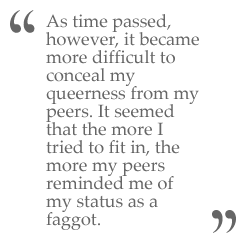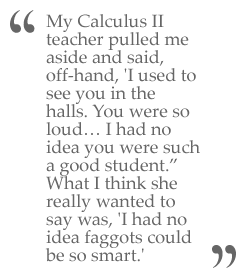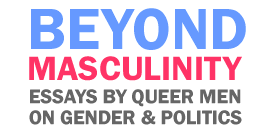Together, we were
fabulous. We were the kind of faggots who dropped
Skittles into our Zima bottles. The little candy pieces
would fizzle and change color as their outside shell
dissolved into the drink. We fucking loved that
shit. Sentences were preceded by “honey” or “sugar” and
things we fancied were divided into three categories:
“fierce,” “fabulous,” and “divine.” It was a world of
polyester built for our own escape, a refuge from the
drudgery that was the “real world.”
***
 Keeping all that I was
learning outside of school separate from the rest of my
life was, at first, manageable. Well aware that my
faggotry relegated me far outside the bounds of Southern
propriety, I tried my best to lay low as much as
possible while in school. As time passed, however, it
became more difficult to conceal my queerness from my
peers. It seemed that the more I tried to fit in, the
more my peers reminded me of my status as a faggot.
Keeping all that I was
learning outside of school separate from the rest of my
life was, at first, manageable. Well aware that my
faggotry relegated me far outside the bounds of Southern
propriety, I tried my best to lay low as much as
possible while in school. As time passed, however, it
became more difficult to conceal my queerness from my
peers. It seemed that the more I tried to fit in, the
more my peers reminded me of my status as a faggot.
After two traumatic
years of middle school, it was clear that the IB program
was not for me. I changed tracks to join my peers from
elementary school in a high school a few miles away from
my house. But middle school had changed me. It has
stamped out the boy that my friends in elementary school
knew. I stared at the ground when I walked the halls. My
face was riddled with acne. I was the portrait of an
angsty teenager. Even back in the suburbs, I was an
outsider.
At the risk of sounding
terribly cliché, I sought solace in the theatre. It was
the only place in high school that managed to
accommodate all of me. Drama class allowed me to piece
together all the pieces of my self into one collective
identity. Since middle school carved me up into pieces,
I had felt like I was performing different versions of
myself depending on who was watching. At home, I did my
best to perform as straight and “normal” as the
circumstances would allow. I would read from another
script at school – that of a quiet, reserved boy who
awkwardly meandered through the hallways while staring
intently down at the floor. On the weekend, I would play
what was perhaps the most accurate reflection of me, the
rebellious gay teenager who liked to smoke, drink, and
party late into the night. My training in theatre gave
me license to experiment with consolidating all of these
versions of myself into a new kind of self, someone less
compromising for his audience.
Drama class also
suddenly opened up a network of peers who didn’t just
tolerate my iconoclastic effeminacy, but celebrated it.
I had never had friends my own age. Sure, I had folks to
eat lunch with or perhaps go to the occasional concert.
But it had been many years since I had had a meaningful
friendship with anyone at school. Misfits themselves, my
friends in the theatre allowed and, indeed,
encouraged me to put to work all that my gay male
friends had taught me in the ways of dramatics.
My newfound home in the
theatre gave me the confidence to bring my nellyness out
into the open. If I was going to be a faggot no matter
what I did, I figured that I might as well “be all that
I could be.” And faggot, I was. In truth, a certain
amount of respect came with wearing candied-apple-red
vinyl pants and 4-inch platforms without so much as
flinching. My outrageous wedge platform heels were,
perhaps, a bit intimidating. I was fierce. One
morning while I was leaning over the counter before
school, my mother actually exclaimed “Look at those
pants! You could bounce a quarter off that thing!” (I’m
still not sure how I was supposed to react to that.) My
father was less excited about my style choices, but I
somehow managed to make it out the door to school
without too much squawking.
My fagalicious wardrobe
didn’t necessarily stop kids from talking shit about me,
but it certainly gave them pause to do it to my face
(“if he’s crazy enough to wear vinyl pants to high
school, God only knows what he could be capable of”). I
banked on the hope that my attitude would keep people
out of my way. To my amazement, my strategy generally
worked. The only time I can recall being verbally
harassed to my face was when some boy quietly mumbled
“That’s right faggot, prance down the stairs” to me
while I was heading downstairs to class. I actually
thought it was kind of flattering.
 I buttressed my social
standing with an uncanny drive to succeed academically.
At my uber-competitive high school of about 2500
students, academic prowess brought some merit. I studied
far more in high school than I ever did in college, and
it paid off. During my senior year, my Calculus II
teacher pulled me aside and said, off-hand “I
used to see you in the halls. You were so loud… I had no
idea you were such a good student.” What I think she
really wanted to say was, “I had no idea faggots could
be so smart.”
I buttressed my social
standing with an uncanny drive to succeed academically.
At my uber-competitive high school of about 2500
students, academic prowess brought some merit. I studied
far more in high school than I ever did in college, and
it paid off. During my senior year, my Calculus II
teacher pulled me aside and said, off-hand “I
used to see you in the halls. You were so loud… I had no
idea you were such a good student.” What I think she
really wanted to say was, “I had no idea faggots could
be so smart.”
Putting myself so
blatantly on the edge of acceptability was, however, not
exactly without cost. It may have protected me from most
name-calling at school, but off-campus my attitude and
fledgling self-assuredness did not negate my status as a
faggot. Even when I tried my very best to tone it down,
everyone knew. Being so damn nelly, in my
experience, obviated telling anybody that I was queer.
My closet came without a door. Grocery store clerks
knew. Elderly couples walking past me in the mall knew.
Hell, even telemarketers knew. And they didn’t like one
bit of it. Attitude or not, as a queer in the South I
was destined to be a social pariah... (continue reading)




16 COMMENTS ON THIS ESSAY:
"Gender, at least as it is currently understood, makes free expression nothing short of impossible – for all of us."
WOW!! This line struck me more than anything-- and there was a lot about this essay that I really connected with. I think that even within the gay community, gender plays a terrible constricting role. Your examples of the Boston "bigwigs" who wanted to parade out the "acceptable" homosexuals is one way this plays out within our community.
With this project, and your writing, I'd say you are well on your way toward becoming a role-model and opinion leader for gay men, much in the grain of Eric Rofes. Sullivan, Savage, and the Queer Eye Cast don't got nothing on you, honey!!
Jason -- thank you for your kind words :)
beautiful essay.
I'm an MTF transsexual, and I live in the Philippines, so I can't say that I identify 100% with the experiences that you'e described. Still, the article is touching, and it is scarily illuminating: much of the gay culture that I've come into contact with seems all to eager to shun minorities within the subgroup that are "embarassing" or "contrary to the cause".
I loved it, keep up the good work : )
What you wrote was interesting but I really don't get what you plan on doing with your life. This and trevorhoppe.com seem more like a hobby than anything else. I would assume your are living off of your parents money to fund everything. I don't see what purpose any of this serves. Sure growing up gay is difficult. It's not accepted as normal anywhere in the world. I know it is normal because i'm gay. You have to learn some things on your own.You are feminine and so are a lot of other guys but there is not as far as I know any reason to study it. Thats what gaydar is you can pick out some hint of being feminine. What difference does being gay have to do with anything anyway? It's who you like to be with or have sex with. Try getting a job where you need to work for a year and them write about how a rich kid actually worked for a year. Paris Hilton you aren't.
Trevor,
You have impressed me greatly. Who would have ever thought after our first one or two meetings we'd still be in communication.
Although I know you think I'm the most egocentric person you ever have met, I foresee great promise and future in all of your endeavors.
You're a great man Charlie Brown. Please keep me informed of any and all published work you have forthcoming, I truly enjoy reading it all.
I miss our fights and those long lectures.... Don't tell anyone, but I may not vote R this time...
Hope you and your family are all well.
Much Love,
Burge
This is great, I loved it. It captured something I really regret about my own life - hardening up, developing sharp edges, and feeling ashamed of the gentle self I was as a child.
I'm interested as well by the response of the commenter Jeremy (above, 1 Sep 08), as it reminds me of responses to my own work on sexual racism. It seems quite strained as he labours to construct a class difference he can invoke as a reason to hate 'on' you. He really, really doesn't want anyone to ask these questions, does he? For some, the indeterminacy that we've learned to cherish is a frightening place they're keen to leave as far behind them as possible.
Daniel -- Yes, the comment from Jeremy is disingenuous at best. He makes some big assumptions about me and my life, without hesitation. I guess I never responded out of some shame that I am an academic, and a recognition that that comes out of a place of privilege. I'm not sure when the idea came around that arguments from anyone with privilege are worthless, but its surely pervasive in feminist / queer / anti-academic circles (those are separate but overlapping spheres). But one thing is clear: he had no interest in engaging the arguments, and instead decided to write a hit piece on me. That's all too often how we engage.
Hi Trevor,
That was a very eloquent essay and I was truly touched by it. Although my experiences so far in life have been very different from yours--I'm a young woman who has grown up in very open-minded communities in the North and who now identifies as "interested in people" (what most people would call bisexual)--you articulated a lot of things that have been on my mind recently and that I've discussed and tried to express with my friends. Thank you for giving my feelings words.
I just found this website and I really like the essays and messages. Good luck with everything you do in the future.
Thanks, Tamar! I hope you enjoy the other essays in the collection! And please do spread the word! xoxo
Amongst other things, as someone formally interested in web design, I wanted to say how wonderful the design of this website is. It reminds me of google in its concept- clear, clean, simple, effective, accessable- which makes it all the more beautiful. The one thing I would suggest though is that the essays themselves are inside an iframe, as to reduce loading time.
I have a slightly different interpretation of those days. However, it was interesting to read about how you perceived who I was. Your perception is very valid and made me giggle, though I feel it paints a picture that is not all that close to my actual reality at the time. Not to say that I wasn't going through similar hardship, but I think I was coming from a very different place and I took a very different path. I haven't finished the article, busy trying to memorize music, but I will finish it soon and would like to talk about this later. Cheers!
Paolo
I thoroughly enjoyed this great essay. Perhaps this is a cheap point, but it reminded me of the pain and humiliation individuals face when they fall outside of gender boundaries. It's those individuals I need to be fighting for, even more so than myself.
As an 18-year-old feminine transgender man who's interested in activism and the intersections of oppressions, I'm having a hard time finding inspiring queer male role models who critique society in the way that you do. This site--and your fantastic essay--makes me hopeful. Thank you.
Aw thanks Oliver :) I'm glad you're finding the collection useful! xoxo
Trevor, wonderful piece! You are a brilliant writer with a great voice. I agree with your closing comments that as the more extreme forms of homophobia shift to the background of our culture, they have a disproportionate impact on poorer and more rural gay populations. You are right on in your fear that the big cities may become complacent and less likely to shake the status quo. But why the attacks on Dan Savage and Andrew Sullivan? Aren't they good examples of queer, "out-there" people who are fighting for gay marriage, comprehensive sex education, and acceptance for gay youth via the "It Gets Better Project". I wouldn't paint them with the same heteronormative brush just because they've gone mainstream, they still have a lot to offer to the conversation on gender and sexual equality.
Hey David, thanks for your comment. I've mellowed out a bit politically since writing this piece. But Dan Savage I think has really repugnant politics when it comes to deviant sex, and it frustrates me. The "It Gets Better" campaign was pretty incredible - though I'd like to see half that energy put into actually getting legislation changed. But I understand that cultural campaigns like that can often have powerful effects, sometimes moreso than legal change.
Andrew Sullivan has all but repented for his neoconservative years. The work he's been doing on immigration equality has been tremendous.
Anyways, glad you've enjoyed the piece. Hope you enjoyed other ones here! xoxo